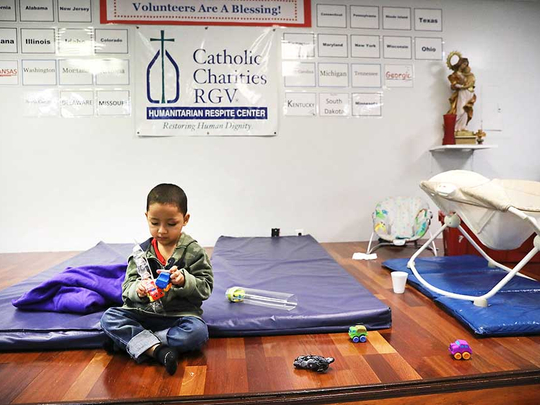
United States President Donald Trump finally caved in to public pressure and promised to stop separating children from parents at the border. After long insisting that he couldn’t do anything about this, he snapped his fingers and changed the policy that he had denied was a policy in the first place.
Yet, the next steps remain unclear and of uncertain legality. Will there be internment camps? This hazy juncture is a useful opportunity to draw lessons.
Trump is right that he didn’t begin the practice of wrenching crying children from their parents. This fits into a long and shameful history:
“My brothers and sisters were bid off first, and one by one, while my mother, paralysed by grief, held me by the hand. Her turn came, and she was bought by Isaac Riley of Montgomery County. Then I was offered to the assembled purchasers. My mother, half distracted with the thought of parting forever from all her children, pushed through the crowd while the bidding for me was going on, to the spot where Riley was standing.
“She fell at his feet and clung to his knees, entreating him in tones that a mother only could command to buy her baby as well as herself ... I must have been then between five and six years old. I seem to see and hear my poor weeping mother now.”
— Josiah Henson, a slave in Maryland, in his account of his life from 1858.
“The Negroes at home are quite disconsolate but this will soon blow over. They may see their children again in time.”
— Thomas Chaplin, a slave owner, in 1845, quoted in Help Me to Find My People, by Heather Andrea Williams.
“My mother then turned to [her owner] and cried, ‘Oh, master, do not take me from my child!’ Without making any reply, he gave her two or three heavy blows on the shoulders with his raw hide, snatched me from her arms, handed me to my master, and seizing her by one arm, dragged her back ... The cries of my poor parent became more and more indistinct. ... The horrors of that day sank deeply into my heart.”
— Charles Ball, whose 1837 autobiography of a life in slavery included this discussion of his separation from his mother at the age of.
The black family “suffers little by separation”.
— Thomas R. Cobb, a pro-slavery legal scholar, in 1858.
“I stared intently, trying desperately not to lose sight of my mother, my little sister with her hair of gold and sun, my grandmother, my older sisters. I see them always, for I am still looking for them, trying to embrace them one last time ... What remains of that night like no other is an irremediable sense of loss, of parting. My mother and my little sister left and I never said goodbye. It all remains unreal.”
— Elie Wiesel, Memoirs, describing how the Nazis separated his family during the Holocaust.
“‘I’m going to take your child to get bathed.’ That’s one we see again and again ... The child goes off, and in a half an hour, 20 minutes, the parent inquires, ‘Where is my five-year-old?’ ... And they say, “You won’t be seeing your child again.’”
— Anne Chandler, Tahirih Justice Center, in Texas Monthly, last week.
“The children will be taken care of — put into foster care or whatever.”
— White House Chief-of-Staff John Kelly last month.
“All I can remember is how much my son and I were both crying as they took him away ... It has been about six months since I last saw my son.”
— A detainee in an ACLU lawsuit filed in April, describing the seizure of his 13-year-old son in October.
“Womp womp.”
— Corey Lewandowski, a Trump surrogate, mocking family separations on Tuesday.
“My babies started crying when they found out we were going to be separated. It breaks my heart to remember my youngest wail: ‘Why do I have to leave? Mami, I want to stay with you!’ My youngest cried and screamed in protest ... In tears myself, I asked my boys to be brave, and I promised we would be together again soon ... I do not know where my sons are, and I am very worried about them.”
— J.I.L., a Salvadoran woman, in the ACLU suit.
“We have an orchestra here.”
— A Border Patrol agent joking last week as children cried inconsolably after being taken from their parents.
So, Mr President, you’re right that you didn’t start family separation. Today’s practice is not the same as slavery or Nazism, but it still fits neatly into the annals of barbarism.
I hope you will genuinely stop this cruelty. One lesson from this history is that while there are always apologists at the time, ultimately we come to appreciate that to wrench shrieking children from the arms of their parents is not just cruel, not just abhorrent, but truly evil.
— New York Times News Service
Nicholas Kristof is an American journalist, author and a winner of two Pulitzer Prizes.








